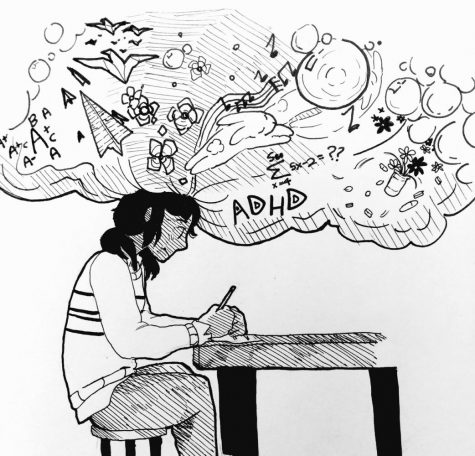Students experience living with ADHD
Attention Deficit Hyper-Activity Disorder (ADHD) and Attention Deficit Disorder (ADD) are developmental learning disorders diagnosed in early childhood, characterized by lack of attention span and impulsiveness. The only difference between the two is that ADD doesn’t effect a person’s impulse and just manifests as inattentiveness. It can be a very complicated disorder since symptoms manifest differently for many people. This and other diagnosis criteria is listed in the DSM-5, The fifth edition Diagnosis and Statistic Manual of Mental Disorders.
ADD and ADHD are classified as brain disorders, but having it can make one eligible for special education services under the SLD (specific learning disability) classification. If one requires it, they can also get a 504 plan as outlined by the IDEA (Individuals with Disabilities Education Act).
The CDC (Center for Disease control and Protection) states that boys are 13.2 percent more likely to be diagnosed than girls, who are diagnosed at a rate of 5.6 percent. Some argue that this is because boys are more likely to get ADD and ADHD than girls, but it is also argued that this is because of gender differences. There may be a bias towards diagnosing boys because girls usually show higher maturity.
Not being able to get a diagnosis along with difficulty paying attention can make it a challenge to do well and participate in school, but students have good feelings about it and different ways they cope.
Freshman Shawn Koerner was diagnosed with ADD and ADHD when he was in third grade. Since then, he has taken Focolin, which is a mild stimulant often used to treat ADD and ADHD.
“Drinking Mt. Dew helps,” Koerner said. “Caffeine affects people with ADD differently. It helps me sleep,”
Many people with ADD seek different coping mechanisms to help themselves so they don’t rely on just the medicine. Senior Sally Lushbough was diagnosed with ADHD when she was five years old and has taken Adderall, Vivance and Dextroamphetamine.
“I’ve been in behavioral therapy since I was diagnosed,” Lushbough said. “My mom had to cut them off since they kept changing.”
Lushbough also said that she has received mean comments from teachers because of her behavioral issues, like one teacher who told her mother she should “use a belt” on Lushbough. This was when she was seven and living in Texas.
Having this disorder isn’t always a setback for people, since with right time and treatment people with ADD are shown to have exceptional creativity and empathy skills. The stigma is changing, and many are seeing it as a blessing rather than a curse. Freshman Marilyn Castaing has seen improvement since she was diagnosed at 8 years old. She takes Adderall.
“I used to not be able to focus and had bad grades,” Castaing said. “Now I have better grades and I focus better.”






